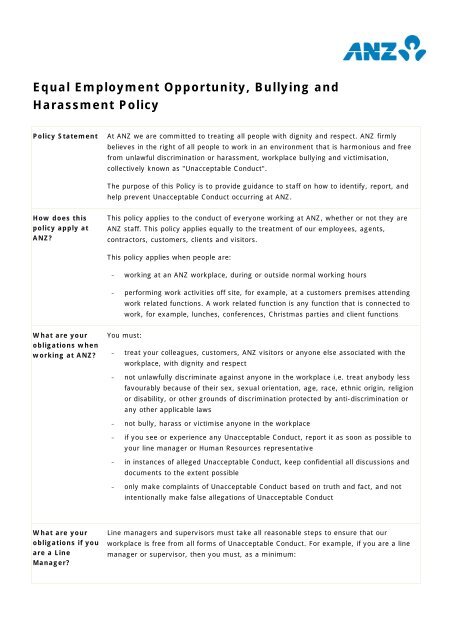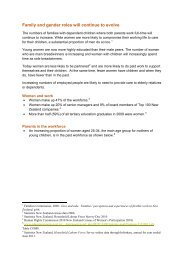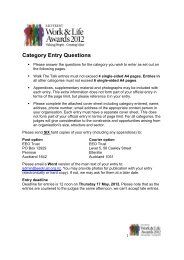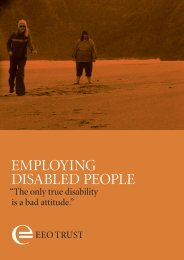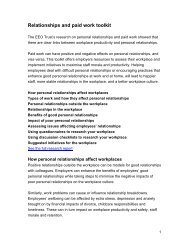Equal Employment Opportunity, Bullying and Harassment Policy
Equal Employment Opportunity, Bullying and Harassment Policy
Equal Employment Opportunity, Bullying and Harassment Policy
Create successful ePaper yourself
Turn your PDF publications into a flip-book with our unique Google optimized e-Paper software.
<strong>Equal</strong> <strong>Employment</strong> <strong>Opportunity</strong>, <strong>Bullying</strong> <strong>and</strong><strong>Harassment</strong> <strong>Policy</strong><strong>Policy</strong> StatementAt ANZ we are committed to treating all people with dignity <strong>and</strong> respect. ANZ firmlybelieves in the right of all people to work in an environment that is harmonious <strong>and</strong> freefrom unlawful discrimination or harassment, workplace bullying <strong>and</strong> victimisation,collectively known as "Unacceptable Conduct".The purpose of this <strong>Policy</strong> is to provide guidance to staff on how to identify, report, <strong>and</strong>help prevent Unacceptable Conduct occurring at ANZ.How does thispolicy apply atANZ?This policy applies to the conduct of everyone working at ANZ, whether or not they areANZ staff. This policy applies equally to the treatment of our employees, agents,contractors, customers, clients <strong>and</strong> visitors.This policy applies when people are:- working at an ANZ workplace, during or outside normal working hours- performing work activities off site, for example, at a customers premises attendingwork related functions. A work related function is any function that is connected towork, for example, lunches, conferences, Christmas parties <strong>and</strong> client functionsWhat are yourobligations whenworking at ANZ?You must:- treat your colleagues, customers, ANZ visitors or anyone else associated with theworkplace, with dignity <strong>and</strong> respect- not unlawfully discriminate against anyone in the workplace i.e. treat anybody lessfavourably because of their sex, sexual orientation, age, race, ethnic origin, religionor disability, or other grounds of discrimination protected by anti-discrimination orany other applicable laws- not bully, harass or victimise anyone in the workplace- if you see or experience any Unacceptable Conduct, report it as soon as possible toyour line manager or Human Resources representative- in instances of alleged Unacceptable Conduct, keep confidential all discussions <strong>and</strong>documents to the extent possible- only make complaints of Unacceptable Conduct based on truth <strong>and</strong> fact, <strong>and</strong> notintentionally make false allegations of Unacceptable ConductWhat are yourobligations if youare a LineManager?Line managers <strong>and</strong> supervisors must take all reasonable steps to ensure that ourworkplace is free from all forms of Unacceptable Conduct. For example, if you are a linemanager or supervisor, then you must, as a minimum:
- lead by example, <strong>and</strong> ensure that you do not engage in Unacceptable Conduct- ensure that your staff are familiar with, <strong>and</strong> underst<strong>and</strong> their obligations under thispolicy- treat all complaints seriously <strong>and</strong> take prompt steps to resolve any complaints madeunder this policy. This may include referring the matter to a Human Resourcesrepresentative where appropriateUnlawfuldiscriminationANZ is committed to maintaining a workplace that promotes equal opportunity for all jobapplicants, employees, contractors, visitors <strong>and</strong> customers. ANZ aims to ensure thatwhen employment decisions are made, they are made based on merit, not on attributessuch as sex, sexual orientation, age, race, ethnic origin, religion or disability, or othergrounds of discrimination protected by anti-discrimination legislation.Unlawful discrimination in employment occurs when one person is treated lessfavourably than someone else is treated, or would be treated, in the same or similarcircumstances, because that person has a particular attribute, such as race, sex orreligion that is specifically listed in equal employment opportunity laws.It is unlawful to discriminate against a person based on any of the following grounds ofdiscrimination (contained in the Human Rights Act 1993);SexDisabilityMarital StatusAgeEthical/religious beliefPolitical opinionColour<strong>Employment</strong> StatusRaceFamily StatusEthnic or national originsSexual OrientationDiscrimination is unlawful even if there is no intention to discriminate. Discrimination isunlawful in all areas of employment, including:- recruitment- terms <strong>and</strong> conditions of employment- refusing or limiting access to opportunities for promotion, discretionary bonuses,leave or training- termination of employmentIt is also unlawful to discriminate or harass a person when providing them with goods orservices. For example, it may be discriminatory to require a blind customer to do theirbanking during non-peak times, because you feel that it takes too much time to servethem during busy periods.
Direct <strong>and</strong> indirect Discrimination can happen either directly or indirectly:discrimination- Direct discrimination occurs when a person is treated less favourably than anotherperson, in the same or similar circumstances, because of a prohibited ground such astheir sex, race, marital status, disability etc.- Indirect discrimination occurs when there is a requirement, rule, policy, practiceor procedure that is the same for everyone, but has an unequal effect on particulargroups. This type of 'requirement' is likely to be indirect discrimination unless therequirement is reasonable in all the circumstances.An example of indirect discrimination would be if ANZ advertised for a vacant role <strong>and</strong>required the successful c<strong>and</strong>idate to start immediately. Two c<strong>and</strong>idates, Margaret <strong>and</strong>Jon, are on parental leave <strong>and</strong> can not start work immediately. This requirement couldindirectly discriminate against Margaret or Jon on the ground of carer's/familyresponsibilities, unless the requirement is reasonable in all the circumstances.Unlawful<strong>Harassment</strong>Unlawful harassment is unwelcome conduct that is offensive, humiliating or intimidatingto any other person <strong>and</strong> is either repeated, or of such a significant nature, that it has adetrimental effect on the person, their work performance or their work environment.Even if there is no intention to offend or humiliate, seemingly harmless acts such asgossip, jokes, teasing or the use of inappropriate nicknames, could all possibly constituteunlawful harassment.SexualharassmentSexual harassment is unwelcome conduct of a sexual nature that is offensive, humiliatingor intimidating to any other person <strong>and</strong> is either repeated, or of such a significant nature,that it has a detrimental effect on the person, their work performance or their workenvironment.It is unlawful to sexually harass another person even if you did not intend to harass theperson.Sexual harassment in the workplace can take various forms. It may involve, for example:- requests for sexual favours, or sexual advances- leering, wolf whistles, obscene gestures, jokes or innuendo- comments or a conversation about a person's sex life or relationships- displays of sexually offensive material, such as emails, posters, pictures, graffiti,screen savers or text messages- suggestive or sexual jokes, suggestive behaviour, telephone calls- uninvited touching, hugging or kissing or other forms of physical contact- invading a person's personal space<strong>Bullying</strong>Workplace bullying is any repeated unreasonable behaviour directed towards a person, orgroup of people, that creates a risk to their mental or physical health <strong>and</strong> safety."Unreasonable behaviour" means behaviour that a reasonable person, having regard to all
the circumstances, would expect to victimise, humiliate, undermine or threaten."Behaviour" includes actions of individuals or a group, <strong>and</strong> may involve using a system ofwork as a means of victimising, humiliating, undermining or threatening. Some examplesof behaviour that may constitute bullying are:- continually making jokes or remarks about a person, or making more remarks aboutone member of a team compared to other team members- verbal abuse, swearing or name calling- excluding or isolating employees- intimidation- assigning meaningless tasks unrelated to a person's job- deliberately changing work rosters to inconvenience particular employees- deliberately withholding information that is vital for effective work performanceOn the other h<strong>and</strong>, bullying is not:- occasional differences of opinion, non aggressive conflicts, <strong>and</strong> problems in workingrelations- allocation of work in accordance with ANZ systems- workplace counselling, constructive feedback, managing under-performance <strong>and</strong>other disciplinary action in accordance with ANZ policies <strong>and</strong> processesVictimisationVictimisation occurs if someone suffers unfavourable treatment because they have made,or propose to make, a genuine complaint of Unacceptable Conduct, or appear as awitness or provide information about such a complaint.Some examples of victimisation include:- suggesting to a would be complainant that it would be better for them (or the team)if they did not make a formal complaint- threatening behaviour- disciplinary action that is not otherwise warranted <strong>and</strong> would not have been taken ifa complaint had not been made- unreasonable change in duties or relocation- exclusion or isolation- failure to promote a person or downgrading a performance rating because they areregarded as a 'trouble maker' due to the complaint- allocating work/tasks which are not usually part of a person's normal duties becausethey have made a complaintComplaintsProcessANZ provides a number of different options for dealing with complaints of UnacceptableConduct.Step 1 - Self resolutionIn many cases, simply telling the person concerned that their behaviour is causing
distress, explaining why it is unwelcome <strong>and</strong> asking for it to stop will be sufficient. Often,the person is not aware that their behaviour is causing distress, <strong>and</strong> they will stopimmediately once told. You should consider approaching the person or people involved toresolve your concern, by means of direct discussion, unless you feel uncomfortable withthis approach.Step 2- Speak with a manager or a Human Resources representativeIf a complaint cannot be resolved by direct discussion, or you do not feel comfortableaddressing the issue face to face, you should discuss the matter with, <strong>and</strong> seek guidancefrom, your line manager, skip level manager, or a Human Resources representative.Your manager or Human Resources representative can provide information on this policy<strong>and</strong> are able to discuss options available to you to deal with your particular concerns.Initiating a discussion with a line manager or Human Resources representative may helpyou to determine whether the behaviour you have experienced constitutes UnacceptableConduct <strong>and</strong> will help you to underst<strong>and</strong> the process, <strong>and</strong> develop options for resolvingyour concerns in the future. For example, they can help you to:- formulate a strategy to facilitate a dialogue between yourself <strong>and</strong> the other personabout your concerns- develop skills to address the alleged behaviour- clearly underst<strong>and</strong> the further options available to you if the matter cannot beresolved by direct discussionStep 3 - Investigation (if required)The first stage in requesting an investigation of a complaint of Unacceptable Conduct, isto speak with a Human Resources representative.After speaking to you, the Human Resources representative will determine whether thebehaviour you are concerned about constitutes Unacceptable Conduct (i.e. whether thebehaviour would amount to unlawful harassment, discrimination, bullying or victimisationif it is found to have occurred) <strong>and</strong> whether the matter requires investigation. Not allcomplaints will be appropriate for investigation.False accusations,vexatiouscomplaints <strong>and</strong>defamationAllegations of Unacceptable Conduct such as discrimination, harassment <strong>and</strong> bullying areserious matters <strong>and</strong> can potentially damage an individual's reputation.If you intentionally make false allegations that a person has been unlawfullydiscriminating against, harassing, bullying or victimising another person, then you may bedefaming the person. It is therefore very important that all complaints of UnacceptableConduct are based on truth <strong>and</strong> fact. Intentionally false accusations, or allegations thatare found to be unsubstantiated because they are of a frivolous or vexatious nature willbe viewed seriously <strong>and</strong>, where found to be intentional or malicious, may result in ANZtaking disciplinary action.If you are unsure whether this part of the policy applies to you, you should speak youyour line manager or a Human Resources representative.
ConfidentialityIn instances of any alleged breach of this policy, discretion is important to protect allpeople concerned. All information must be treated confidentially, to the extent possible,by all parties involved.Where a complaint is serious <strong>and</strong>/or a line manager or Human Resources representativebelieves that action needs to be taken, absolute confidentiality may not be able to bemaintained even if a complainant does not wish the matter to be taken further. In thesecircumstances, information will be disclosed only to those people who need to know aboutthe complaint. The obligation of confidentiality does not prevent ANZ from using ordisclosing any material necessary to instigate or defend any legal proceedings, or makesubmissions in relation to any enquiry or complaint or to refer a matter to the police.Breach of this<strong>Policy</strong>ANZ will take disciplinary action against anyone who engages in Unacceptable Conduct orbreaches any other aspect of this policy, which may include a written warning <strong>and</strong> inserious cases, or cases of repeated behaviour, termination of employment orengagement.Where can I go for If you need to ask any questions or seek guidance about this policy, you can contact:help about thispolicy?- your line manager or skip line manager- a Human Resources representativeIf you are making a complaint, you should do so as soon as possible after theconduct you are concerned about occurs.


